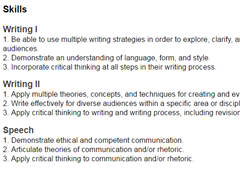You are currently browsing the tag archive for the ‘skills’ tag.
 I hope to persuade you that your summer plans should include a strategy for creating at least one substantive product that demonstrates your skills.
I hope to persuade you that your summer plans should include a strategy for creating at least one substantive product that demonstrates your skills.
This matters because you will eventually be competing for a job, program or grant and those candidates who have demonstrated relevant skills shall prevail.
It is not hard to demonstrate a skill, but so few people do so that those who grasp its value will gain power.
Here is a formula for demonstrating your skills:
1. Identify a skill to promote
2. Do something that uses that skill
3. Produce a commentary on what you did,
4. Publish your commentary publicly
5. Refer employers and evaluators to your product.
To identify a promotable skill [step 1 of the formula] review the objectives of what you have already accomplished and find out what your potential audience values.
All of the courses and programs that you have completed have performance objectives stated in the syllabi or other descriptive documents.
objectives stated in the syllabi or other descriptive documents.
A strong way to prepare an account of your abilities is to review the performance objectives that you have met and write a paragraph expressing the specific knowledge or action that fulfills each objective.
I put each learning objective for the courses that I take (I am pursuing a MA in Psychology) on an index card at the start of the term, then write a statement of specific knowledge that fulfills the objective on each card at the end of the course.
Employers and evaluators tell us what they value and you should pay attention to what they are saying.
Read “The Six Critical Abilities Students Need for Success After College” in Forbes Magazine.
The employable skills listed in that article are; Think analytically, Express ideas effectively through written communication, Exchange ideas effectively through oral communication, Bring innovation to their work, Envisage and work independently on a project, Accept and act on criticism.
Read “IDC study reveals skills today’s students need to succeed in tomorrow’s unimagined world.”
When you look at a job application consider whether any of the parts asked for map to the skills identified by employers in these studies.
Acknowledging what you have accomplished, there is always more that you can do to validate a skill [step 2 of the formula] and the solutions are no further than your mobile phone.
Thousands of online courses, seminars, textbooks, eBooks and audio books are available for free or cheap.
Some of these are validated by universities such as Open Oregon State, MIT OpenCourseware, Stanford Online, and Merlot.
 I recommend that you take a look at “Adventures in Writing” from Stanford Online which is a series of lessons presented in graphic novel style that you can take for free.
I recommend that you take a look at “Adventures in Writing” from Stanford Online which is a series of lessons presented in graphic novel style that you can take for free.
I ask you, is “I succeeded in a writing course from Stanford” or “I completed a seminar taught by a Nobel Prize laureate at MIT” worth having in your cover letter?
Even better, all such offerings have performance objectives so that you may map your skills back to what employers are seeking.
Open Culture is a massive repository of free online learning resources.
Even a little bit of computer programming knowledge is valuable in the job market and even the most non-technical of us can gain such knowledge at Khan Academy an Code Academy.
I am not suggesting that you pursue C++ coding, but that a truthful statement such as “mastered the basics of writing macros in Word in this certified tutorial” or “over summer break I learned Javascript which I applied to the website at…”
While you are learning something you may as well turn it into evidence of your competence (step 3 of the formula) by writing a review of the course-book-article-video that you studied and post your review on a blog or a review site such as Goodreads.
With even a small repertoire of such publications (step 4 of the formula) you will have objective evidence of your skills in learning and communication to be references in resumes, cover letters, and applications.
Consider the following statements from two job applications:
“I have excellent communication and collaboration skills.”
“My communication skills are demonstrated by my book reviews at link and my collaboration skills are demonstrated in the report that I produced from a group project at link” [step 5 of the formula].
If you were an employer, which statement would invite you to take another look at the candidate?
If acting on this advice interests you, please send your thoughts and  outcomes to me at drtech@oregonstate.edu.
outcomes to me at drtech@oregonstate.edu.
I wish graduating seniors and all degree recipients luck in entering an amazing career; your path to excellence is just beginning.
Fare ye well and come back to us some times, because once a Beaver always a Beaver.
To you who will return in Fall, have a wonderful summer, plenty of fun, make sure you learn something and make it count for you.
Image Acknowledgements
Wenger_EvoGrip_S17.jpg
http://en.wikipedia.org/wiki/Swiss_Army_knife#/media/File:Wenger_EvoGrip_S17.JPG
14695-adventures_module.jpg
http://news.stanford.edu/news/2015/january/writing-adventures-illustrated-010815.html
image3.jpeg
http://www.thewisejobsearch.com/2010/07/filling-out-job-applications-why-and.html



